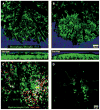Inflammatory neuroprotection following traumatic brain injury
- PMID: 27540166
- PMCID: PMC5260471
- DOI: 10.1126/science.aaf6260
Inflammatory neuroprotection following traumatic brain injury
Abstract
Traumatic brain injury (TBI) elicits an inflammatory response in the central nervous system (CNS) that involves both resident and peripheral immune cells. Neuroinflammation can persist for years following a single TBI and may contribute to neurodegeneration. However, administration of anti-inflammatory drugs shortly after injury was not effective in the treatment of TBI patients. Some components of the neuroinflammatory response seem to play a beneficial role in the acute phase of TBI. Indeed, following CNS injury, early inflammation can set the stage for proper tissue regeneration and recovery, which can, perhaps, explain why general immunosuppression in TBI patients is disadvantageous. Here, we discuss some positive attributes of neuroinflammation and propose that inflammation be therapeutically guided in TBI patients rather than globally suppressed.
Copyright © 2016, American Association for the Advancement of Science.
Figures


References
-
- Homsi S, et al. J Neurotrauma. 2010;27:911–921. - PubMed
Publication types
MeSH terms
Grants and funding
LinkOut - more resources
Full Text Sources
Other Literature Sources

